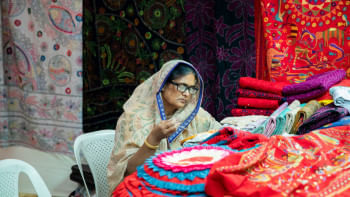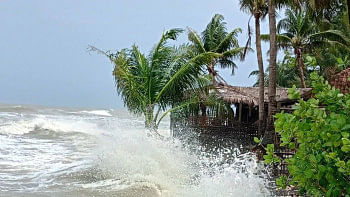The treacherous banking journey of women entrepreneurs

In 2022, for the eighth consecutive year, Bangladesh was recognised as the most gender-balanced country in South Asia by the World Economic Forum (WEF). According to its Global Gender Gap Report 2022, Bangladesh is the only country in the region to have bridged more than 70 percent gender gap. While it is true that in many parameters, Bangladesh did manage to bring about meaningful changes to promote gender parity, including in education and healthcare, women's financial inclusion remains a major pain point for the nation and its policymakers.
Despite more women joining the workforce and even venturing into entrepreneurship – central bank data suggests that more women have been coming under the financial sector in recent years; to be specific, Bangladesh Bank's quarterly statistics report for July-September 2021 reveals there were 8,812 new women entrepreneurs in September 2021, which is a 34 percent increase compared to March 2021 data – their overall access to finance remains difficult and often riddled with pitfalls.
In 2010, the national policy targeted 15 percent of total SME loan disbursement to women-led, women-founded enterprises. But unfortunately, it has constantly remained below four percent over the last one decade – 3.54 percent in FY22. In the last 10 years, the highest it ever reached was a mere 3.93 percent in 2014.
Considering the growing number of women entrepreneurs in the country, these numbers show how irresponsive our banking sector has been to their financial needs.
While banking experts stick to their conservative, templated response that women entrepreneurs' lack of creditworthiness – read lack of collaterals, documentation, etc – result in them often not getting the loans they apply for, there is very little that these banks have done over the years to work around these problems and offer innovative solutions to women entrepreneurs.

It is true that in a country like Bangladesh, the patriarchal mindset still persists and women have little access to property or finances, outside their own income. But the question one cannot help asking is: do these external factors really make our women ineligible to access finance through banking channels? Or are there ways to help them out, but the banks are not willing to go the extra mile to find the solutions? Or perhaps it is easier for the banks to sanction a big loan (say, Tk 50 lakh) to a single client and follow up with them for recovery, rather than to follow up with 10 different SME clients for the same loan volume?
One also cannot help but wonder, despite the central bank allowing loans of up to Tk 25 lakh to women SME owners without collaterals, why do banks still fuss over this issue whenever they are questioned by the media regarding the low coverage of women entrepreneurs in the SME loan disbursement pie?
Another point that banks often highlight to support their argument is women entrepreneurs' lack of awareness about the various packages that the government has offered them. One might also ask these banks: what are they doing to promote these packages and raise awareness about them?
What most banks do at best is offer small workshops, crash courses and training for women entrepreneurs to help them with their financial literacy. But even among the participants at these programmes, only a handful would eventually get access to finance from the organiser banks, if at all.
It seems most of these programmes are conducted to tick the CSR box, without much focus on its actual effectiveness for the women beneficiaries or in improving their creditworthiness. Had these trainings or workshops been really impactful, by the virtue of logic, all these participants should have been offered access to finance by the organiser banks.
What is worse is that even the central bank is aware of the lacklustre attitude of the commercial banks to offer tailored loans to women entrepreneurs, and yet they only say that they are monitoring the situation. A media report recently quoted the central bank general manager as saying, "Many banks disbursed incentive loans in compliance with the policy. But there are some exceptions. We have seen SME loans being given to affluent people. We are looking (into) these irregularities."
If the central bank has seen SME loans being disbursed among "affluent" people, why are they still "looking" into these issues? Why are they not taking action against the rogue banks? Why is the central bank not taking a hard-line approach to ensure that the regulatory guidelines are followed to the dot by the lenders?
It is unfortunate that in a country where known loan defaulters and scammers are allowed to bilk banks big time, honest women entrepreneurs are being deprived of their rightful access to finance – in all probability, on the account of their gender.
As a country that is leading gender parity in South Asia, it is high time for Bangladesh – and the Bangladesh Bank, specifically – to look into the real issues that are obstructing women's access to finance, including the societal and economic outlook. That way, perhaps both the lenders and the beneficiaries can be guided to find solutions and navigate the challenges facing them.
Tasneem Tayeb is a columnist for The Daily Star. Her Twitter handle is @tasneem_tayeb

 For all latest news, follow The Daily Star's Google News channel.
For all latest news, follow The Daily Star's Google News channel. 







Comments